| Reviews & Columns |
|
Reviews DVD TV on DVD Blu-ray 4K UHD International DVDs In Theaters Reviews by Studio Video Games Features Collector Series DVDs Easter Egg Database Interviews DVD Talk Radio Feature Articles Columns Anime Talk DVD Savant Horror DVDs The M.O.D. Squad Art House HD Talk Silent DVD
|
DVD Talk Forum |
|
|
| Resources |
|
DVD Price Search Customer Service #'s RCE Info Links |
|
Columns
|
|
|
French Masterworks: Russian Emigres in Paris 1923-1929 - 5 Iconic Films Albatros Productions
Flicker Alley // PG-13 // May 14, 2013
List Price: $59.95 [Buy now and save at Amazon]
The Films:
In February of 1920, a group of seasoned Russian filmmakers arrived inParis France US
The Burning Crucible (Le Brasier Ardent, 1923): The first three films in this collection feature Ivan Mosjoukine, a great actor who is largely forgotten today. This film, which Mosjoukine not only stars but also wrote and directed, is a wonderful example of his talent. A married woman, Elle, is adored by her rich husband who caters to her every whim. She has buttons by her bed so she can eat breakfast, apply her makeup and even have her dogs brought to her without ever getting up. From humble origins, she seems to have everything that she desires.
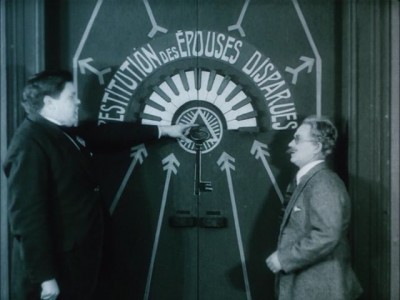
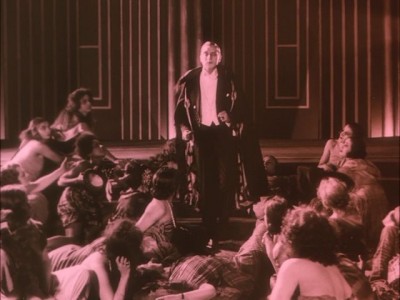
There is one problem though: her husband, who hails from South America, wants to sell their house and leaveParis
This is an impressive and creative movie that's a lot of fun to experience. The first section of the movie is filled with surreal images and events. It starts off with a tinted dream sequence that is very avant-garde and climaxes with the wonderfully odd Seeker's Club where nothing seems natural. This was a fun and visually exciting way to start the ball rolling.
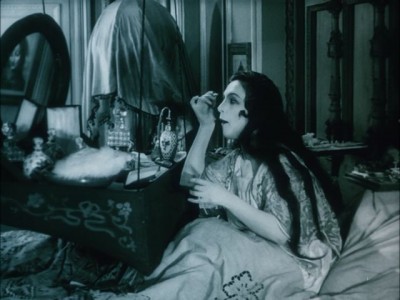
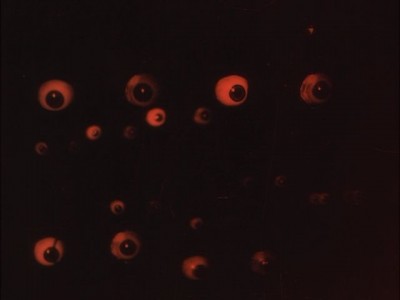
After that, the plot takes over and the movie becomes a standard, if slightly off skew, love triangle. The strange images and unusual characters make way for a more mainstream telling of the story. It may sound odd, but it works well. The surreal elements draw viewers in, while the solid plot gets them to stay.
Kean (1924): This is a biopic of the 19th Century actor, Edmund Kean. You may remember him for his famous last words: "Dying is easy, comedy is hard." Made some 90 years after his death, the film tells of the greatest actor of his time, a man toasted as the greatest actor of all time. Great though he may have been on the stage, his personal life was a wreck. He was hounded by creditors, had a problem with alcohol, and to make matters worse, had fallen in love with the wife of an ambassador.
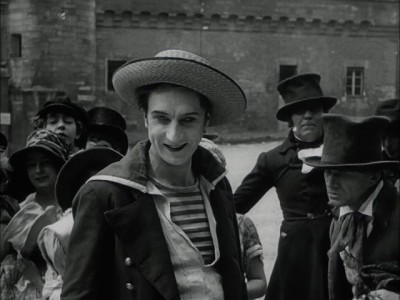
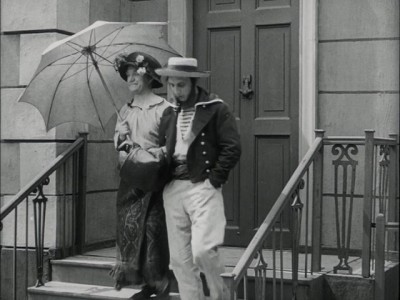
Troubled by the fact that he loves, and is loved, by someone he cannot have, he drowns his troubles in drink, seeming to have a grand time dancing till all hours of the night while really in terrible pain. He's shown to be a kind man too, however, putting on a benefit performance of Hamlet in order to help some traveling thespians who have fallen on hard times. Unbeknownst to the popular actor, this performance, with the object of his affection as well as her husband in the audience, will have dramatic consequences on his life.
This movie is basically a showcase for Ivan Mosjoukine who plays the title role. The movie begins with a 20-minute sequence from Romeo and Juliet, and there are extended scenes of Kean playing other roles from Shakespeare. It a great vehicle for Mosjoukine to declare that he's a serious and talented actor, which he undoubtedly is, but it doesn't work as well as it should. When Kean is on stage, Mosjoukine seems to be in 'acting' mode, using exaggerated gestures and deliberate, thought-out motions. This makes the "performances" seem more wooden than the rest of the film where he has a more natural style. The fact that we can't hear Kean speaking and have to read title cards instead also subtracts from the performance.
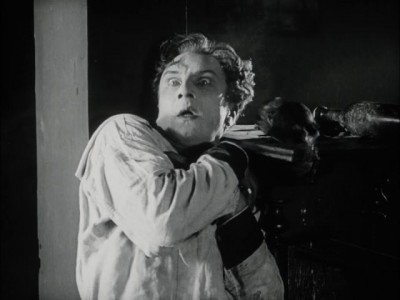
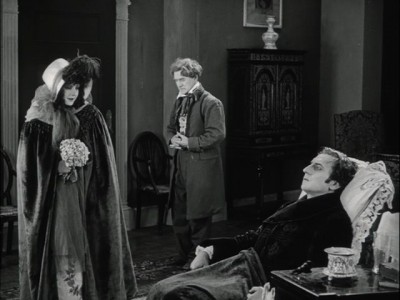
Still, it is a good film, even if you didn't know anything about Kean aside from that one famous quote. There are some very good scenes, like when Kean gets drunk in the pub, and double exposures were used in a very effective manner.
The Late Mathias Pascal (Feu Mathias Pascal, 1926):
Mathias Pascal (Ivan Mosjoukine) is the oldest son in a well-to-do family. Expected to take over the family lands, and all the responsibility that entails, he's a dreamer who yearns for freedom. He's working on a book, The History of Liberty, when his father unexpectedly dies and the family falls on hard times. His mother is forced to sell the ancestral estate and gets swindled in the deal.
As this is happening, Mathias' best friend, Pomino, has fallen in love with the town beauty, Romilde. He's too shy to actually speak with her however, so he convinces Mathias to approach her on his behalf and declare his love. During the harvest celebration Mathias manages to get Romilde away from the crowds and, a bit awkwardly, tells her that he has a friend who has admired her from afar. The young lady thinks that Mathias is talking about himself, and since she's had a crush on him for a long time she's thrilled. She confesses her love to the object of her affection, Mathias is taken by surprise but excited, and the next thing you know they're married.
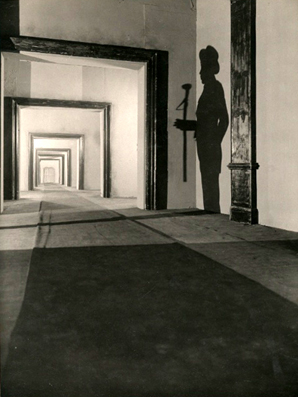
Domestic life doesn't quite suit Mathias who only wants to be free. While he loves his wife, his mother-in-law is a harsh shrew who lives with them and poisons her daughter against Mathias. He doesn't have any skills to speak of, but finally lands a job at the library, a disorganized and dusty place. It doesn't pay much, but he's able to support his wife, her mother, and the baby girl that comes along.
Mathias loves his daughter dearly. She's the only person he really loves aside from his mother, so it's no surprise that's he devastated when a disease sweeps through the town and takes both his aged mother and his baby girl. It's too much for him to take, so he gets on a train and runs away toMonte Carlo
Still devastated by the loss in his life, Mathias walks through the streets as if in a dream and ends up in a casino where, against all odds, he wins a fortune. With money no longer a worry, he travels back home to share the good news with his wife, but on the way back he spies an article in a newspaper stating that the decomposed body of Mathias Pascal in a river. It's assumed that he committed suicide over the grief of his loss and his money worries.
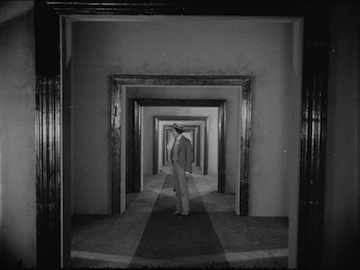
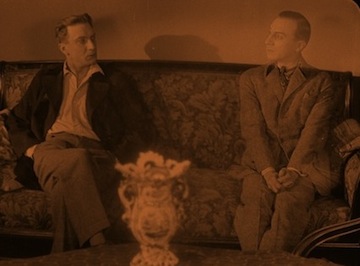
With this news Mathias realizes that he's finally free. He doesn't have to worry about money, he doesn't have to worry about his wife and mother-in-law. He doesn't even have a name anymore. At last he has total liberty! So he travels to Rome where he takes a room at a boarding house and falls in love again, and slowly comes to realize that being totally free has its disadvantages too.
Writer/director Marcel L'Herbier creates a bravura film that works on several levels. Running only a few minutes shy of three-hours long, the director basically looks at Mathias' life twice. Once while he's alive and a second time after he has 'died.' It's interesting to see how the character behaves before and after he's liberated, and how he handles the pitfalls that life throws in his way in both scenarios.
By this time in film history directors had discovered how powerful images could be and worked to construct them. L'Herbier goes out of his way to create interesting compositions. There are a couple of reoccurring themes that work well to both tell the story and make it visually engaging. Several times he has an object fill most of the frame in the foreground while the action was taking place in the background. It was different, but worked well in the context. He's also fond of repeating images, such as several doorways, successively smaller, repeating down a long hallway.
L'Herbier also comes up with some wonderful and unique ways to solve the problems that he comes across in the course of the film. For example, how do you show the passage of time between Mathias falling in love with Romide and when they're married and living with her mother? That intervening time isn't important to the story, but you have to let viewers know that time has passed and events have occurred that impact the characters. L'Herbier solution is to have Mathias and Romide dance around when they first fall in love, he then superimposes that over a scene of the pair getting married, and dancing. This dance scene is then cross-faded with the pair dancing in their home, no longer wearing fancy wedding garb but the tattered clothes that they a accustomed to. The movie is filled with interesting visual flourishes, a dream sequence and a part where Mathias fights with himself spring to mind, that make it an incredible visual feast.
Star Ivan Mosjoukine also gives a magnificent performance in the title role, as would be expected. He's uses a lot of very subtle facial expressions to reveal what he's thinking and its impressive how much he can do with so little movement. The scene where he realizes that Romilde is in love with him is a great example. The camera focuses on him, and goes from nervousness to surprise to elation with just the smallest changes in his face. There's no over the top scene chewing here. He's also at home in the comic aspects of the character. If anything, he's more at ease in those scenes.
Gribiche (1925): The final two movies in this collection, while not featuring Ivan Mosjoukine are directed by Jacques Feyder (Carnival in Flanders, Greta Garbo's Anna Christie) which is a fair trade off. The first of these, Gribiche, is a nice, charming film.
Mrs. Maranet is a very rich woman who encounters young Gribiche in a department story one day when he offers her a minor assistance. Gribiche, who lives with his widowed mother, is from a lower class background... they're not destitute but they struggle a bit. Mrs. Maranet is taken by the boy and decides to adopt him and give him a proper upbringing. Soon Gribiche finds himself with tutors and butlers and other servants all keen to turn him into a proper gentleman. He's put on a rigid schedule and taught how to dress and behave in polite company. Yes he has better food, but is it all worth it?
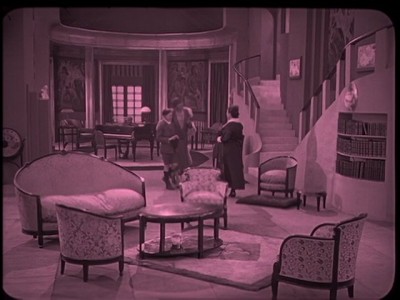
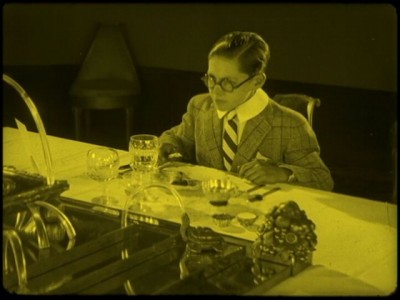
This film, like many that Feyder would create, is beautiful to watch. The sets are especially well done, and the difference between the living environments of the working class and rich are nicely illustrated. While the latter fills their enormous homes with gorgeous but uncomfortable furniture, the lower class goes for function rather than glitz.
The New Gentlemen (Les Nouveaux Messieur, 1929): This is another Feyder film and it also touches on the differences between the classes as well as the effects of power on an average man, but this one is a comedy.
Susanne Verrier is a dancer with the Paris Opera, and while she's not the greatest dancer ever, she has turned the head of the Count de Montoire Grandpre, a wealthy member of parlement who lavishes her with gifts and helps her career any way she can.
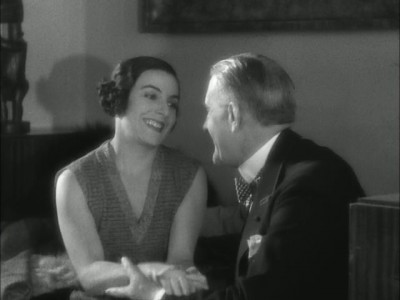
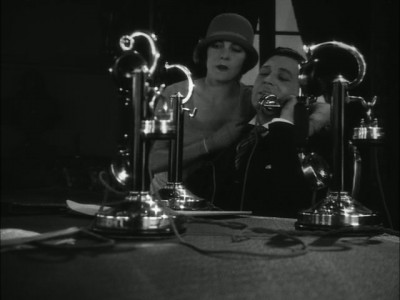
Also with the Paris Opera is Jacques Gaillac, an electrician and local union leader. He's secretly in love with Verrier but knows he can't compete with a Count. At least he doesn't have a chance until a strike propels him to prominence and he ends up elected to Parliament while the Count is less influential than he used to be.
This is a lovely farce pitting the newly powerful against the old guard, and it's still topical today in a lot of respects. Feyder does a magnificent job setting up the premise and letting it run. There are a lot of amusing scenes that work quite well, especially Gaillac's unfamiliarity with his new life.
Audio:
These films all come with new scores arranged and performed by some very talented musicians. One of my favorite groups working to add music to early films is the Mont Alto Motion Picture Orchestra and they do a wonderful job on Gribiche. Other musicians include Neil Brand, Robert Israel, Timothy Brock, and Antonio Coppola. All of the scores were very good and I couldn't find fault with any of them.
Video:
These films all look beautiful. They are clear, crisp, and wonderful to see. The contrast is excellent overall and the level of detail is very good. There are some small spots and dirt occasionally, but they never mar the presentation. An excellent looking collection of films.
Extras:
The only extra is a scene from Gribiche that was discovered in a foreign release print, but not included in the French version of the film. It last a tad under 3 minutes and features the young boy encountering a drunk on Bastille Day.
While the DVDs themselves don't come with many extras, there is a very nice 28-page booklet with an essay on the history of Albatros by Lenny Borger as well as notes on the individual films. It's a good read and a great addition to the set.
The first pressings (at least) of this set also include a $5 off coupon when buying The Italian Straw Hat, another Albatros film, from Flicker Alley's on-line store.
Final Thoughts:
These are surprisingly good. I wasn't familiar with the output of Albatros aside from The Late Mathias Pascal before I screened these movies and I was quite impressed. From the witty The New Gentlemen to the avant-garde Burning Crucible and the endearing Gribiche, there's something for all tastes. Add to that the wonderful prints and the appealing scores and the result is a fantastic set. Highly Recommended.
In February of 1920, a group of seasoned Russian filmmakers arrived in
The Burning Crucible (Le Brasier Ardent, 1923): The first three films in this collection feature Ivan Mosjoukine, a great actor who is largely forgotten today. This film, which Mosjoukine not only stars but also wrote and directed, is a wonderful example of his talent. A married woman, Elle, is adored by her rich husband who caters to her every whim. She has buttons by her bed so she can eat breakfast, apply her makeup and even have her dogs brought to her without ever getting up. From humble origins, she seems to have everything that she desires.


There is one problem though: her husband, who hails from South America, wants to sell their house and leave
This is an impressive and creative movie that's a lot of fun to experience. The first section of the movie is filled with surreal images and events. It starts off with a tinted dream sequence that is very avant-garde and climaxes with the wonderfully odd Seeker's Club where nothing seems natural. This was a fun and visually exciting way to start the ball rolling.


After that, the plot takes over and the movie becomes a standard, if slightly off skew, love triangle. The strange images and unusual characters make way for a more mainstream telling of the story. It may sound odd, but it works well. The surreal elements draw viewers in, while the solid plot gets them to stay.
Kean (1924): This is a biopic of the 19th Century actor, Edmund Kean. You may remember him for his famous last words: "Dying is easy, comedy is hard." Made some 90 years after his death, the film tells of the greatest actor of his time, a man toasted as the greatest actor of all time. Great though he may have been on the stage, his personal life was a wreck. He was hounded by creditors, had a problem with alcohol, and to make matters worse, had fallen in love with the wife of an ambassador.


Troubled by the fact that he loves, and is loved, by someone he cannot have, he drowns his troubles in drink, seeming to have a grand time dancing till all hours of the night while really in terrible pain. He's shown to be a kind man too, however, putting on a benefit performance of Hamlet in order to help some traveling thespians who have fallen on hard times. Unbeknownst to the popular actor, this performance, with the object of his affection as well as her husband in the audience, will have dramatic consequences on his life.
This movie is basically a showcase for Ivan Mosjoukine who plays the title role. The movie begins with a 20-minute sequence from Romeo and Juliet, and there are extended scenes of Kean playing other roles from Shakespeare. It a great vehicle for Mosjoukine to declare that he's a serious and talented actor, which he undoubtedly is, but it doesn't work as well as it should. When Kean is on stage, Mosjoukine seems to be in 'acting' mode, using exaggerated gestures and deliberate, thought-out motions. This makes the "performances" seem more wooden than the rest of the film where he has a more natural style. The fact that we can't hear Kean speaking and have to read title cards instead also subtracts from the performance.


Still, it is a good film, even if you didn't know anything about Kean aside from that one famous quote. There are some very good scenes, like when Kean gets drunk in the pub, and double exposures were used in a very effective manner.
The Late Mathias Pascal (Feu Mathias Pascal, 1926):
Mathias Pascal (Ivan Mosjoukine) is the oldest son in a well-to-do family. Expected to take over the family lands, and all the responsibility that entails, he's a dreamer who yearns for freedom. He's working on a book, The History of Liberty, when his father unexpectedly dies and the family falls on hard times. His mother is forced to sell the ancestral estate and gets swindled in the deal.
As this is happening, Mathias' best friend, Pomino, has fallen in love with the town beauty, Romilde. He's too shy to actually speak with her however, so he convinces Mathias to approach her on his behalf and declare his love. During the harvest celebration Mathias manages to get Romilde away from the crowds and, a bit awkwardly, tells her that he has a friend who has admired her from afar. The young lady thinks that Mathias is talking about himself, and since she's had a crush on him for a long time she's thrilled. She confesses her love to the object of her affection, Mathias is taken by surprise but excited, and the next thing you know they're married.

Domestic life doesn't quite suit Mathias who only wants to be free. While he loves his wife, his mother-in-law is a harsh shrew who lives with them and poisons her daughter against Mathias. He doesn't have any skills to speak of, but finally lands a job at the library, a disorganized and dusty place. It doesn't pay much, but he's able to support his wife, her mother, and the baby girl that comes along.
Mathias loves his daughter dearly. She's the only person he really loves aside from his mother, so it's no surprise that's he devastated when a disease sweeps through the town and takes both his aged mother and his baby girl. It's too much for him to take, so he gets on a train and runs away to
Still devastated by the loss in his life, Mathias walks through the streets as if in a dream and ends up in a casino where, against all odds, he wins a fortune. With money no longer a worry, he travels back home to share the good news with his wife, but on the way back he spies an article in a newspaper stating that the decomposed body of Mathias Pascal in a river. It's assumed that he committed suicide over the grief of his loss and his money worries.


With this news Mathias realizes that he's finally free. He doesn't have to worry about money, he doesn't have to worry about his wife and mother-in-law. He doesn't even have a name anymore. At last he has total liberty! So he travels to Rome where he takes a room at a boarding house and falls in love again, and slowly comes to realize that being totally free has its disadvantages too.
Writer/director Marcel L'Herbier creates a bravura film that works on several levels. Running only a few minutes shy of three-hours long, the director basically looks at Mathias' life twice. Once while he's alive and a second time after he has 'died.' It's interesting to see how the character behaves before and after he's liberated, and how he handles the pitfalls that life throws in his way in both scenarios.
By this time in film history directors had discovered how powerful images could be and worked to construct them. L'Herbier goes out of his way to create interesting compositions. There are a couple of reoccurring themes that work well to both tell the story and make it visually engaging. Several times he has an object fill most of the frame in the foreground while the action was taking place in the background. It was different, but worked well in the context. He's also fond of repeating images, such as several doorways, successively smaller, repeating down a long hallway.
L'Herbier also comes up with some wonderful and unique ways to solve the problems that he comes across in the course of the film. For example, how do you show the passage of time between Mathias falling in love with Romide and when they're married and living with her mother? That intervening time isn't important to the story, but you have to let viewers know that time has passed and events have occurred that impact the characters. L'Herbier solution is to have Mathias and Romide dance around when they first fall in love, he then superimposes that over a scene of the pair getting married, and dancing. This dance scene is then cross-faded with the pair dancing in their home, no longer wearing fancy wedding garb but the tattered clothes that they a accustomed to. The movie is filled with interesting visual flourishes, a dream sequence and a part where Mathias fights with himself spring to mind, that make it an incredible visual feast.
Star Ivan Mosjoukine also gives a magnificent performance in the title role, as would be expected. He's uses a lot of very subtle facial expressions to reveal what he's thinking and its impressive how much he can do with so little movement. The scene where he realizes that Romilde is in love with him is a great example. The camera focuses on him, and goes from nervousness to surprise to elation with just the smallest changes in his face. There's no over the top scene chewing here. He's also at home in the comic aspects of the character. If anything, he's more at ease in those scenes.
Gribiche (1925): The final two movies in this collection, while not featuring Ivan Mosjoukine are directed by Jacques Feyder (Carnival in Flanders, Greta Garbo's Anna Christie) which is a fair trade off. The first of these, Gribiche, is a nice, charming film.
Mrs. Maranet is a very rich woman who encounters young Gribiche in a department story one day when he offers her a minor assistance. Gribiche, who lives with his widowed mother, is from a lower class background... they're not destitute but they struggle a bit. Mrs. Maranet is taken by the boy and decides to adopt him and give him a proper upbringing. Soon Gribiche finds himself with tutors and butlers and other servants all keen to turn him into a proper gentleman. He's put on a rigid schedule and taught how to dress and behave in polite company. Yes he has better food, but is it all worth it?


This film, like many that Feyder would create, is beautiful to watch. The sets are especially well done, and the difference between the living environments of the working class and rich are nicely illustrated. While the latter fills their enormous homes with gorgeous but uncomfortable furniture, the lower class goes for function rather than glitz.
The New Gentlemen (Les Nouveaux Messieur, 1929): This is another Feyder film and it also touches on the differences between the classes as well as the effects of power on an average man, but this one is a comedy.
Susanne Verrier is a dancer with the Paris Opera, and while she's not the greatest dancer ever, she has turned the head of the Count de Montoire Grandpre, a wealthy member of parlement who lavishes her with gifts and helps her career any way she can.


Also with the Paris Opera is Jacques Gaillac, an electrician and local union leader. He's secretly in love with Verrier but knows he can't compete with a Count. At least he doesn't have a chance until a strike propels him to prominence and he ends up elected to Parliament while the Count is less influential than he used to be.
This is a lovely farce pitting the newly powerful against the old guard, and it's still topical today in a lot of respects. Feyder does a magnificent job setting up the premise and letting it run. There are a lot of amusing scenes that work quite well, especially Gaillac's unfamiliarity with his new life.
The DVD:
These five films arrive on five DVDs, all of which fit in a single-width DVD case. Audio:
These films all come with new scores arranged and performed by some very talented musicians. One of my favorite groups working to add music to early films is the Mont Alto Motion Picture Orchestra and they do a wonderful job on Gribiche. Other musicians include Neil Brand, Robert Israel, Timothy Brock, and Antonio Coppola. All of the scores were very good and I couldn't find fault with any of them.
Video:
These films all look beautiful. They are clear, crisp, and wonderful to see. The contrast is excellent overall and the level of detail is very good. There are some small spots and dirt occasionally, but they never mar the presentation. An excellent looking collection of films.
Extras:
The only extra is a scene from Gribiche that was discovered in a foreign release print, but not included in the French version of the film. It last a tad under 3 minutes and features the young boy encountering a drunk on Bastille Day.
While the DVDs themselves don't come with many extras, there is a very nice 28-page booklet with an essay on the history of Albatros by Lenny Borger as well as notes on the individual films. It's a good read and a great addition to the set.
The first pressings (at least) of this set also include a $5 off coupon when buying The Italian Straw Hat, another Albatros film, from Flicker Alley's on-line store.
Final Thoughts:
These are surprisingly good. I wasn't familiar with the output of Albatros aside from The Late Mathias Pascal before I screened these movies and I was quite impressed. From the witty The New Gentlemen to the avant-garde Burning Crucible and the endearing Gribiche, there's something for all tastes. Add to that the wonderful prints and the appealing scores and the result is a fantastic set. Highly Recommended.
|
| Popular Reviews |
| Sponsored Links |
|
|
| Sponsored Links |
|
|
| Release List | Reviews | Shop | Newsletter | Forum | DVD Giveaways | Blu-Ray | Advertise |
|
Copyright 2024 DVDTalk.com All Rights Reserved. Legal Info, Privacy Policy, Terms of Use,
Manage Preferences,
Your Privacy Choices | |||||||













